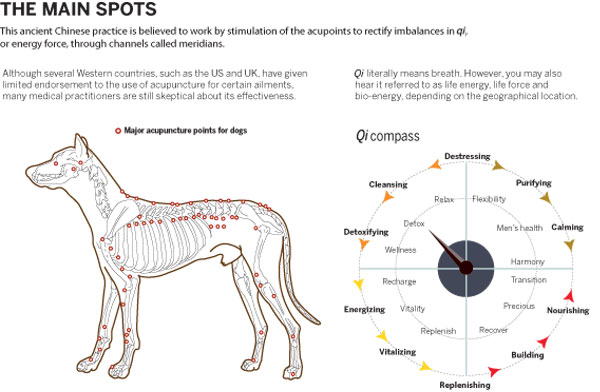Animals benefit from pin-point accuracy
 0 Comment(s)
0 Comment(s) Print
Print E-mail China Daily, June 12, 2012
E-mail China Daily, June 12, 2012
The trump card
Around a dozen pet hospitals in Beijing offer acupuncture, making the city the Chinese center of animal acupuncture, mainly thanks to the efforts of Liu Lang. Liu, president of the Beijing Small Animal Veterinary Association and owner of the Companion Animal Hospitals chain, established acupuncture departments in his hospitals several years ago.
 |
"My motivation was very simple at the beginning - the pet health industry on the mainland started relatively late, and we're about 50 years behind the US, 40 years behind Europe and 20 years behind Japan. We have to consider what we have been good at during that time frame," said Liu. "Acupuncture is our trump card, because it originated in China."
According to Liu, the application of acupuncture and traditional Chinese herbal treatment for animals is not limited to urban areas. "Rural vets have always used these methods to save livestock, because they didn't know about Western medicine years ago."
However, the situation changed after the introduction of Western veterinary medicine. "Nowadays, people think a Western pill is more effective than Chinese herbal treatments and that injections work more quickly than acupuncture, but they don't even consider the side effects, such as food safety," said Liu. "The more drugs you use, the greater the residue left in the animal."
Moreover, in contrast to the "barefoot vets", who are rarely well-educated and treat animals according to experience and with medicines whose recipes have been handed down for generations, the vets practicing animal acupuncture in Hong Kong and Taiwan have certificates from countries such as the US and the UK.
One of them, Doctor Patricia Shuen, who runs an animal hospital called Pet Cares in Hong Kong, finished an acupuncture course in Australia five years ago. "My pet hospital is a member of the International Veterinary Acupuncture Society, which is an American society established in the early 1970s," she said, adding that her course of study in Australia was based purely on traditional Chinese medicine for animals, but undertaken by doctors who were trained in the West.
"Clients ask for it every day," said Shuen. "They are the number one reason why we provide alternative therapies, because they all want something more than just drugs or surgery."






Go to Forum >>0 Comment(s)